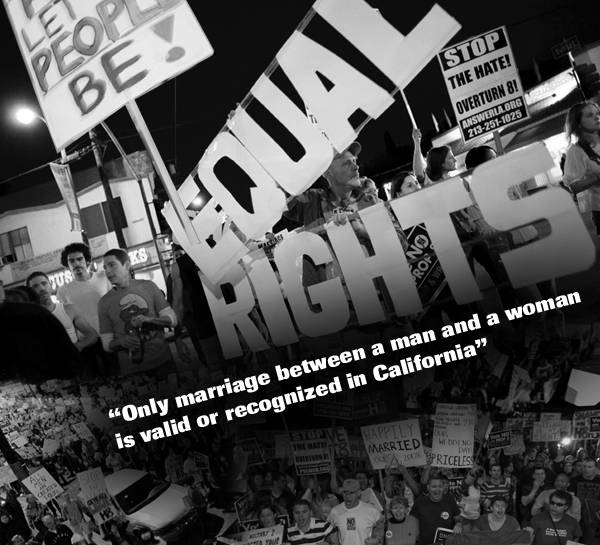PRELL: The politics of fear

Graphic: Brian Hanson/Iowa State Daily
November 12, 2008
I’m not going to be funny today. I’m not going to be snide with this column — or at least that it most certainly not my intention.
I write this with great humility and respect, begging you, my audience, for a constructive dialogue in which we may attempt to learn from one another.
I am not angry about Proposition 8. I am not saddened. I feel no emotion, really — nothing but a pressure that simply aches as it weighs heavily on my heart and on my soul.
This is a brand new day for the United States. We are, and have been, redefining gender and its importance in our society, which, in turn, has caused a struggle to find a true representation of what it is to be in a relationship.
The “best” we have is the highly idealized notion of one man and one woman for life, and we label it — incorrectly — as the “traditional” form.
In truth, there have been many documented forms of relationships from a covenant joining of a man and a woman, to the much more historically common form of one man and many women.
We should remember also it was not long ago that wives were considered property of their husbands, and brutal forms of control — often physically violent — were used to reinforce this idea.
Indeed, it was even more recent ly that interracial marriages were allowed, with precedent set by Loving v. Virginia. In that case, it was argued that miscegenation laws obstructed and interfered with the Constitution, as they defied “the pursuit of happiness.”
In both of these cases, many were overjoyed, yet some undoubtedly wept with loss, despairing that marriage had become something new. Something they did not know.
And the unknown is always terrifying.Some implications of gay marriage, in Prop 8 strategist Jeff Flint’s mind, are the very notions that gay marriage, gay adoption or homosexuality itself should be tolerated being taught in schools.
Flint fears that such teachings and beliefs would be forced on American families against their will, despite a lack of historical evidence to support his claim.
Yet, I understand that fear. I understand the desire to protect children and hope the best for them.
I have been very fortunate to have a loving family that supports and accepts me for who I am.
But even I realize it has not come without a price to them. I know they fear for my safety. I know they despair for my battles. I know it is something that is at their side at all times, never letting go: Fear.
I know many in the LGBT community, including myself, who have wished to not be this way, to not be something so feared.
We are feared. We hate others because they fear us. We hate ourselves for not being good enough.
Our most prominent leaders have used us — have turned us against one another. The tide must turn, and knowledge must spread if there is to be a true reconciliation.
I do not blame the religious for their fear, nor do I despise them for it. In fact, I admire those with strong faith, because it’s something I’m not capable of.
To believe and adhere to the codes one values so deeply is an extremely admirable trait.
This makes it all the sadder that so many lies, so many rumors and so many unfounded threats are aimed at this populace in an effort to twist that unshakable belief into leverage for political agendas.
There have been so many twists and distortions, it has become hard to distinguish right from wrong. The same line in Corinthians that supposedly prohibits gays from entering the Kingdom was once used to condemn those who masturbated.
Adulterers too, were once condemned to grisly death, and divorcees were seen as sexually immoral, even in the New Testament, as Matthew 19:6 states plainly, “What therefore God has joined together, let not man separate.”
I don’t know if the next step that Proposition 8 supporters will take will be the abolition of divorce, but I doubt it.
I’ll reiterate: Fear is a powerful motivator, and one I, too, would have been swayed by, had I been able to make my voice heard in the vote on Prop 8.
I would have been afraid. And I am.
I fear for the nearly 18,000 couples who stood before friends, families, and millions who hoped their state may have some day seen the same privileges. Those who, with light in their hearts and the purest of intentions in their soul, gave a resounding message:
“I do.”
















